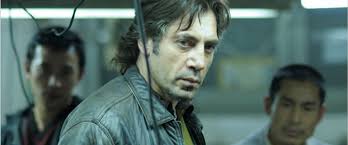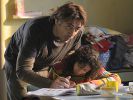Eye For Film >> Movies >> Biutiful (2009) Film Review
Biutiful
Reviewed by: Val Kermode

After Babel, Iñárritu wanted to make a film about just one character, in just one city, in his own native language. He always had Javier Bardem in mind for the character of Uxbal. The city is Barcelona and Uxbal is a man who is dying. But this is a film about life and how it becomes more precious as it runs out. What does a man do in the final days of his life?
In every big city of Europe, in the neighbourhoods that are hidden, there are people living marginal and precarious lives. They are the illegal workers from many countries, exploited on a daily basis, trying to survive and to help those left behind.

Uxbal is a native Castillian living in the multi-ethnic district of Badalona. (The choice of district has its own resonance, as this is where Franco deliberately displaced many people in the Sixties in an attempt to break up Catalonia.) Uxbal sets up deals with Chinese workers and the Africans who work the streets selling the goods they produce. He takes money from the Chinese bosses and pays a corrupt member of the police for protection. He supplies Chinese construction workers to union dodging bosses and finds cellars for some of these poor people to sleep in.
Uxbal also has a more unusual way of making money. He can sometimes hear the voices of those who have recently died, and he passes on messages to their grieving relatives. At first this seems an odd supernatural element in a story dealing with the new social and political reality of Europe. But it is this strand which shapes the film, from its initially perplexing pre-title scenes to the conclusion where these same scenes are replayed from a slightly different angle, offering a note of hope in what would otherwise be a bleak tragedy.
So many people depend on Uxbal the fixer, but most of all his two young children. He is struggling to be a good father to them, like the father he imagines but never knew. Their mother, Marambra (Maricel Alvarez), is bipolar and not coping (which includes working as a hooker and sleeping with his brother.) Uxbal has custody, but after his cancer diagnosis is persuaded to move back in with her, a happy family set up which is doomed to failure.
As the story develops, Uxbal becomes increasingly desperate to provide for his children, to help those around him for whom he feels responsible and to find a personal acceptance of death. Tragic events occur which underline this urgency.
Like Babel, there is a thread of common humanity which runs through this film. People are seen to be selfish and fallible, but help also comes from unexpected places. Many of the characters here are played by non actors who had lives parallel to the world of the film. A Senegalese woman, Igé, at first appears as a minor character, but becomes a cornerstone of the story. She is played by Diaryatou Daff, who in real life has suffered the sort of violence common to refugee women.
There is a dramatic sequence in the middle of the film, an event which many of us are familiar with. Young African men are selling handbags to tourists on the Ramblas when police cars appear. The call goes out and café tables are overturned, vehicles swerve and tourists panic as the men flee. With rapid Bourne-style editing, the camera follows them down alleyways.
Iñárritu, who this time was the writer as well as director, shows his confidence in handling the intimate family scenes as much as the action sequences. He proves once again that he can draw wonderfully natural performances from children, here played by Guillermo Estrella and first-timer Hanaa Bouchaib. As wife Marambra, and also making her film debut, Argentinian Maricel Álvarez captures both the danger and the tenderness of her character.
But it is Javier Bardem, present in almost every scene, who carries the film. He portrays Uxbal as initially the tight and controlling father, gradually becoming more liberated and gaining wisdom through his pain, to the point where he can forgive his wife for her failings and allow himself to see that he is not indispensible, even to his children. He gives a stronger, more all-encompassing performance here than we have seen in any of his previous films. This was an actor-director partnership worth waiting for.
Some will be put off by the depressing theme of a devoted father who knows he is dying, and Iñárritu still hasn’t quite shaken off his tendency to preach. But this is a film with real heart. And the title? Uxbal’s daughter asks for help with her spelling homework. With the best of intentions, we don’t always get things right.
Reviewed on: 18 Jan 2011

















